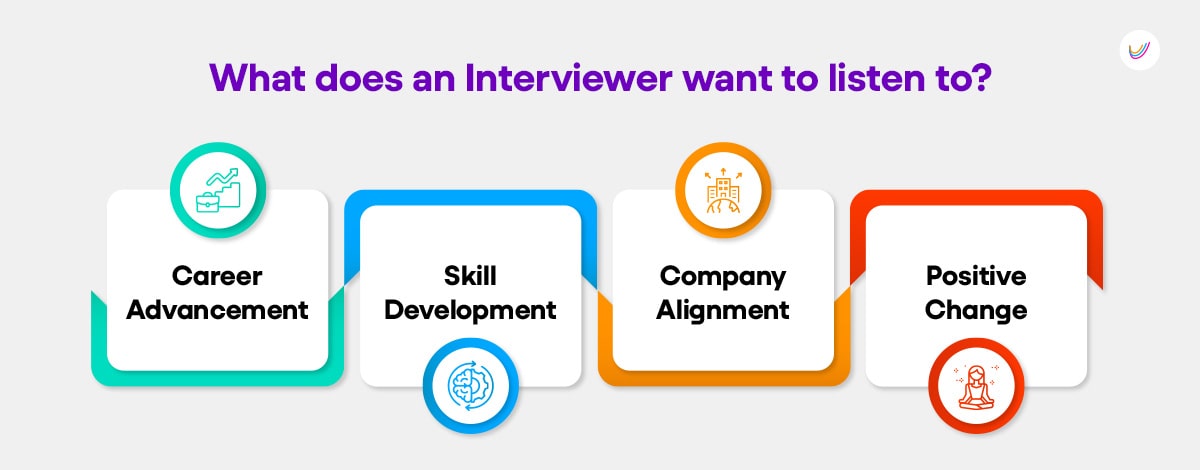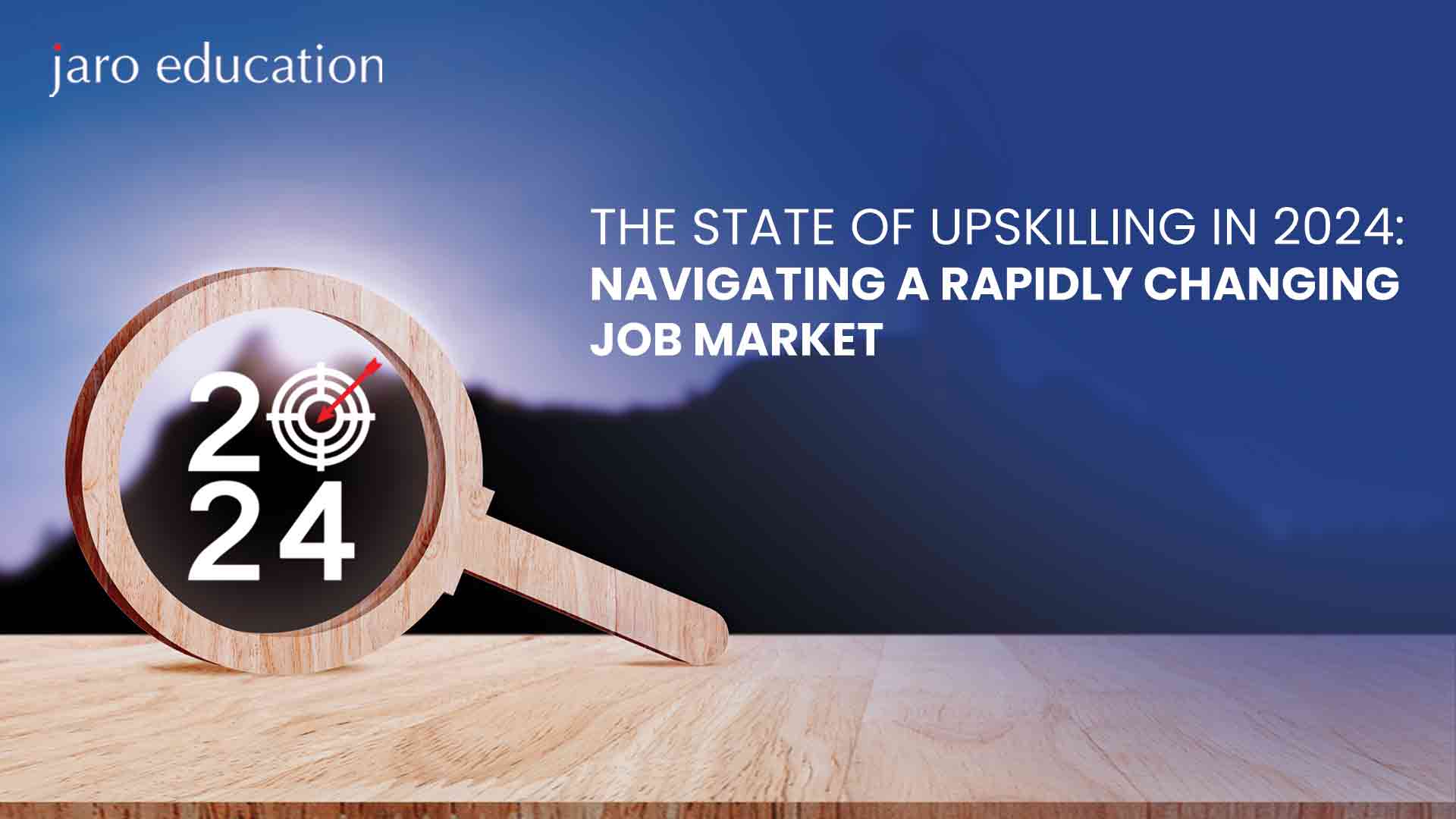Top 10+ Reasons for Job Change: Interview Tips
Table of Contents

- jaro education
- 10, April 2024
- 10:00 am
Are you finally ready to resign and factor in your job search?
To counter this, you should prepare for one of the flagship questions- What is your reason for leaving this job?
No matter what reason there may be, the one thing to keep in mind is to be honest, provided you don’t speak ill of your past employers, since that will not leave you in good stead with recruiters.
To help you with that a little better, here are 10+ good reasons for a job change that you can share when resigning with your future employers.
As per the India Talent Trends Report by Michael Page, an overwhelming 98% of professionals are open to exploring new job opportunities and considering job changes. The “Reason for a Job Change” question is a common and critical aspect of interviews, requiring candidates to articulate their motivations effectively.

*Shine
Job Change - The Most Profitable Explanations
Below are a few of the best reasons for a job change that you can give while facing any questions about job change during an interview:
-Someone else can do it better!
-Another opportunity with more challenges.
-Better job security needs.
-New skill locker opened.
-Even better growth opportunities.
-Moving away.
-Management influence unacceptable.
Let’s now discuss these explained reasons in detail below.
How to Explain Your Job Change Decision in a Positive Light

*Foundit.in
Looking For the best answer to the ‘best reason for a job change’ in the interview? Here you go with several samples you can use to answer this question:
1. Career Advancement

*AAFT Online
One of the primary reasons professionals consider changing jobs is to advance their careers. This may involve seeking promotions, higher salaries, or opportunities for skill development and professional growth. During interviews, emphasize your achievements, skills, and goals related to career advancement to showcase your ambition and potential contributions to the new role.
When discussing career advancement during job interviews, it’s essential to articulate your aspirations clearly while highlighting your achievements and skills that align with your goals. Begin by emphasizing your desire for growth and development within the organization, expressing enthusiasm for taking on new challenges and responsibilities.
In your response, mention specific achievements from your previous roles that showcase your ability to drive results and contribute significantly.
Best response to an interview question about the reason for job change:
“I’m very passionate about advancing my career and taking on new challenges that allow me to grow both professionally and personally. In my previous role as a project manager, I successfully led a cross-functional team to deliver a major project ahead of schedule and under budget, resulting in a 20% increase in client satisfaction scores.
I decided to make a career move because I was seeking opportunities for advancement and professional growth. In my previous role, while I gained valuable experience and skills, I felt that there were limited prospects for career progression and challenges that would help me reach my full potential.
I actively sought out opportunities for skill development, pursued relevant certifications, and mentored junior team members to showcase my readiness for advancement. However, I realized that to achieve my career aspirations and continue growing professionally, I needed a role that offered clear paths for progression, mentorship programs, and challenging projects that would stretch my abilities.
Therefore, I am now seeking a company that prioritizes career development and offers a supportive environment for employees to advance their careers. I am confident that by leveraging my skills, achievements, and ambition, I can contribute significantly to the success of the organization while advancing my own career goals.
I’m excited about the possibility of joining a company that values employee growth and development, and I’m eager to contribute my skills and experience to achieve mutual success.
Career advancement is a key motivator for professionals contemplating the best reason for a job change, aiming for promotions, higher salaries, and opportunities for skill enhancement and professional growth. Articulating your aspirations, achievements, and skills during interviews is crucial to demonstrating your ambition and potential value to the new role. Highlighting specific accomplishments can underscore your capacity to deliver results and contribute meaningfully. Pursuing a Bachelor of Computer Application (BCA) from Manipal University Jaipur can further bolster your credentials, equipping you with the necessary technical knowledge and practical skills for significant career advancement.”
2. Better Work-Life Balance
Achieving a healthy work-life balance is essential for overall well-being and job satisfaction. If your current job lacks flexibility or imposes excessive work demands, you may consider changing to a role that offers a better work-life balance. Attaining a harmonious work-life balance is vital for overall well-being and job satisfaction. If your current job doesn’t provide the flexibility you need or places excessive demands on your time, transitioning to a role that offers a better work-life balance can be a compelling the best reason for a job change.
During interviews, it’s important to convey your priorities regarding work-life balance. Discuss how achieving a balance between work responsibilities and personal life contributes to your productivity, motivation, and overall happiness. Emphasize the importance of having time for family, hobbies, and self-care, as it enhances your effectiveness and job performance.
The best response to an interview question about reason for job change:
“I decided to change jobs because I was prioritizing achieving a better work-life balance. In my previous role, the demands of the job often spilt over into my personal time, making it challenging to maintain a healthy balance between work and life. The lack of flexibility and long hours impacted my well-being and overall job satisfaction.
I believe that maintaining a healthy balance between work and personal life is key to long-term productivity and job satisfaction. Thus I’m seeking a role that values work-life balance and provides opportunities for flexible working hours or remote work options when feasible. I understand the importance of meeting deadlines and fulfilling job responsibilities, but I also believe that having time for family, hobbies, and self-care enhances overall well-being and contributes to better performance at work.
I’m interested in learning more about the company’s approach to work-life balance and its policies regarding flexible work arrangements. Could you share some insights into how the company supports employees in achieving a healthy work-life balance?”
3. Company Culture Fit

The cultural compatibility between an individual and the organization they work for plays a pivotal role in shaping job satisfaction, employee engagement, and overall success. Company culture encompasses a wide range of aspects, including values, beliefs, work ethics, communication styles, teamwork dynamics, leadership approach, and the overall work environment.
Professionals often seek the best reason for a job changes to transition into organizations whose culture aligns closely with their values, principles, and preferences. This alignment fosters a sense of belonging, engagement, and motivation among employees, leading to higher job satisfaction and productivity.
During interviews, candidates should assess the company’s culture through various means. This can include researching the company’s mission, vision, and values, observing interactions during interviews or company visits, seeking insights from current or former employees, and asking specific questions related to teamwork, communication channels, decision-making processes, employee development programs, diversity and inclusion initiatives, and work-life balance policies.
Reason for a job change best answer: I decided to change jobs primarily because I realized that the company culture at my previous organization wasn’t aligned with my values and work preferences. During my time there, I found that the emphasis was more on individual achievements rather than teamwork and collaboration, which is something I value highly. There was also a lack of open communication channels, making it challenging to get timely feedback or share ideas effectively.
Additionally, I observed that employee engagement initiatives were minimal, and there wasn’t much emphasis on professional development or creating a supportive work environment. As someone who values continuous learning and growth, I felt that the company’s culture didn’t provide the opportunities I needed to further my career and enhance my skills.
In contrast, I am now seeking a company with a culture that values teamwork, open communication, and employee engagement, and provides opportunities for growth and development. During interviews, I specifically inquire about these aspects to ensure that the company’s culture aligns with my values and work preferences. I believe that a positive company culture is crucial for job satisfaction, productivity, and long-term success, which is why I decided to change jobs and find an organization where I can thrive professionally and personally.
4. Opportunity for Learning and Development
Engaging in continuous learning and skill development is pivotal for advancing in one’s career and remaining competitive in today’s job market. Pursuing new job opportunities that offer comprehensive learning experiences, structured training programs, and avenues for career development can substantially augment your skill set and enhance your attractiveness to employers.
When discussing this aspect during interviews, it’s crucial to demonstrate your passion for learning and professional advancement. Showcase your proactive approach to acquiring new skills, staying abreast of industry advancements, and actively seeking opportunities to broaden your expertise. Provide tangible examples of how you’ve actively pursued learning opportunities in previous roles and elaborate on the positive impact it had on your performance and contributions to the organization. This not only showcases your commitment to personal and professional growth but also underscores your readiness to excel in a dynamic work environment.
How to best answer the interview question “Reason for job change?”
“I decided to change jobs because I was seeking greater opportunities for learning and professional development. In my previous role, while I gained valuable experience, I felt that there were limited avenues for expanding my skills and knowledge. I believe that continuous learning is essential for staying competitive in today’s dynamic job market and for personal growth.
I look for organizations that offer robust training programs, mentorship opportunities, and support for acquiring new skills and certifications. This aligns with my career goals of continuous improvement and staying updated with industry trends.
Hence, I am actively looking for a company that aligns with my principles of continuous learning and growth, fostering a nurturing environment for ongoing skill refinement. I firmly believe that by continually broadening my knowledge base and sharpening my skills, I can add substantial value to the organization’s achievements while also propelling my career forward.”
5. Salary and Benefits
Financial factors, such as salary, bonuses, and perks, frequently play a pivotal role in shaping decisions related to changing jobs. Professionals may pursue opportunities offering enhanced compensation, improved benefits packages, or performance-driven rewards in their quest for a more rewarding career.
During salary and benefits discussions in interviews, it’s crucial to navigate this topic with diplomacy and professionalism. Emphasize your achievements, expertise, and the unique value you can deliver to the company to substantiate your salary requirements effectively. By showcasing your capabilities and contributions, you can align your compensation expectations with the value you bring to the organization.
Emphasize how your experience and expertise align with the role’s requirements and contribute to the company’s success. Additionally, inquire about the company’s compensation structure, benefits offerings, and opportunities for performance-based rewards. Understanding the organization’s policies regarding salary increments, bonuses, health insurance, retirement plans, and other benefits will help you make informed decisions and negotiate effectively.
Reason for a job change best answer: I decided to pursue a new opportunity primarily due to considerations regarding salary and benefits. While I appreciated the experience and challenges of my previous role, I felt that my compensation did not adequately reflect my skills, contributions, and the market value of my role.
In my previous role, I consistently achieved targets, exceeded expectations, and demonstrated leadership qualities. However, I realized that to continue growing professionally and financially, I needed a compensation package that aligned more closely with my skills and contributions.
Additionally, I place great importance on benefits like health insurance, retirement plans, paid time off, and avenues for professional development. A robust benefits package not only adds considerable value but also showcases the organization’s dedication to employee welfare and professional advancement.
Therefore, I sought out a new role that offered a competitive salary, performance-based incentives, and a robust benefits package. I believe that fair compensation and comprehensive benefits not only recognize my achievements but also motivate me to excel and contribute effectively to the success of the organization.
6. Job Security and Stability
Job security and stability are crucial considerations for professionals, especially during economic uncertainties or industry changes. Many professionals may decide to change jobs to join financially stable companies or industries with growth opportunities.
When discussing job security and stability during interviews, approach the topic with a focus on understanding the company’s financial health, long-term growth strategies, and resilience during difficult periods. Ask questions about the company’s performance history, market position, revenue stability, and any plans for expansion or diversification.
A possible response when asked about your reason for changing jobs during an interview is:
One of the key reasons I decided to pursue a new opportunity was to seek greater job security and stability. While I appreciated the challenges and growth opportunities in my previous role, I became increasingly concerned about the company’s financial stability and its ability to weather industry fluctuations. Job security is paramount to me, and I believe joining a financially stable organization with a clear growth trajectory provides a sense of assurance and confidence in the long-term viability of my role.
In my previous role, I observed shifts in market dynamics that impacted the company’s stability, leading to uncertainties among employees. This experience reinforced my belief in the importance of joining organizations that prioritize stability, resilience, and employee well-being during economic uncertainties.
Therefore, I am now seeking a company that prioritizes job security and stability, values its employees’ contributions, and has a solid plan for sustainable growth. I believe that by aligning myself with an organization that offers a stable work environment, I can contribute effectively and build a long-term career path.
7. Career Transition or Industry Change
Some professionals change jobs to transition to a new career field or industry. This may involve acquiring new skills, pursuing a passion, or exploring diverse career opportunities.
During interviews, it’s crucial to highlight how your transferable skills and past experiences align with the requirements of the new career field or industry. Emphasize any training, certifications, or projects you have undertaken that demonstrate your readiness and commitment to succeed in the new role.
Furthermore, explain your motivation for the career transition. Whether it’s a passion for the new industry, a desire for personal growth, or the pursuit of new challenges, clearly articulate why you are excited about the opportunity and how it aligns with your long-term career goals.
Reason for a job change, listing one of the best answers:
“I decided to make a career transition and join this new industry because I have always been passionate about [industry/field]. While I valued my experiences and achievements in my previous role, I felt a strong desire to explore new challenges and opportunities that align more closely with my interests and long-term career goals.
In my previous role, I developed valuable skills such as [mention relevant skills], which I believe are transferable and beneficial in this new industry. For instance, I led [project/initiative] where I honed my [specific skill] and achieved [specific result]. These experiences not only showcased my capabilities but also sparked my interest in transitioning to [new industry/field].
I am excited about the innovative projects and dynamic environment of this industry. It offers me a chance to leverage my existing skills while also acquiring new knowledge and expertise. I have taken proactive steps to familiarize myself with the trends, technologies, and best practices in [industry/field], ensuring that I am well-prepared for this transition.
Moreover, I see this move as a strategic career decision that aligns with my long-term aspirations. I am eager to contribute my unique perspective, skills, and passion to [company name] and play a role in driving innovation and growth within the industry.”
8. Skill Expansion
Demonstrating the intention to widen one’s skills and experiences in different areas so that one can turn out to be a better all-around professional.
Reason for a job change, listing one of the best answers:
“I am excited by the prospect of diversifying my skill set. I am sure that I have done well in my current role, but learning more about [highlight specific area] would do a lot for my career and bring an interesting new perspective to any team I join.”
9. Company Reputation
This statement embodies the desire to work with companies boasting a positive work atmosphere, values, and employee satisfaction.
Reason for a job change, listing one of the best answers:
“Your organization has an extraordinary reputation for developing a positive work environment and responsible employee development. Therefore, I think my skills and values completely fit into your organization’s mission, which would be a good platform for my own development.”
10. High Attrition Rate
A high attrition rate in companies can be a very valid and often ignored reason. Working in a dynamic workplace often makes focus on work difficult owing to a lack of stability and ownership over processes.
Moreover, when you witness constant attrition around you, you start spotting trends in dissatisfaction among employees (particularly the good ones), which causes them to take resignation and exit avenues of quick departure.
Reason for a job change, listing one of the best answers:
“While I have valued my time at my current company, I have seen a high attrition rate, which I want to say I value less. I want a workplace with employee retention at the heart of its coherence and collaboration. Your company has the image of valuing and retaining talent, and that aligns with my career aspirations and the desire to contribute for the long haul.”
11. Dream Position Offered
You’ve received your career-brightener offer.
Reason for a job change, listing one of the best answers:
“I recently got offered a job that would appear to be a dream offer for fulfilling my long-term career objectives. The position fits my background and skills but also gives me an exciting opportunity to work in a field I quite like.”
12. A New Challenge
Seeking a job more challenging than the one offered to extend your professional horizon.
Reason for a job change, listing one of the best answers:
“I want to be challenged in my work life once again. I have attained meaningful work experience through my present role, so I would now like to and deserve to, take on added responsibilities and be part of projects that truly test my capacity of understanding.
This difference will, I believe, keep my enthusiastic involvement high and provide fertile ground for my continuous professional development.”
13. Industry Trends
Moving to an industry with stronger long-term prospects and growth possibilities can be a judicious decision on account of a strong understanding of market trends and forthcoming opportunities.
Reason for a job change, listing one of the best answers:
“I am excited to be joining an industry with tremendous growth and trend evolution. As I have researched, my career aspirations are in line with this sector, and I am eager to develop my skills in an industry that I consider to hold immense potential for my growth and advancement personally and professionally.”
14. Geographic Relocation
From a personal perspective, an interstate relocation can be validated with reasons for employment, giving credence to the notion of work-life integration.
Reason for a job change, listing one of the best answers:
“My decision to seek opportunities in this region is primarily driven by personal considerations. I see great potential in aligning my professional aspirations with the needs of my family.
Relocating to this area will allow the furthering of my personal life objectives while also applying my own expertise to contribute meaningfully to a new professional community.”
The Purpose of Recruiters' Question: "Why Are You Looking for a Job Change?"
-
- Assessing Motivation and Commitment: By delving into a candidate’s reasons for considering the reason for a job change, recruiters gain valuable insights into their level of motivation and commitment. Understanding what drives a candidate to explore new opportunities helps recruiters gauge their enthusiasm and dedication toward potential roles.
- Validating Intentions: Recruiters aim to ensure that candidates have genuine and valid reasons for wanting to transition from their current positions. By probing into the factors motivating the job change, recruiters can assess whether the candidate’s aspirations align with the responsibilities, culture, and growth prospects offered by the hiring organization.
- Cultural and Job Fit: The question about the reason for a job change reasons also allows recruiters to evaluate the candidate’s fit with the company’s culture and the specific job role. It provides an opportunity to delve deeper into whether the candidate’s career goals, values, and work preferences align harmoniously with the organization’s ethos and the demands of the role they are applying for.
- Risk Mitigation: Recruiters use this question as a means to identify any potential risks or concerns associated with the candidate’s previous job experiences. They seek to uncover any patterns of job instability, unresolved conflicts, or mismatched expectations that could impact the candidate’s performance or longevity within the new role.
- Informed Decision-Making: By gathering comprehensive insights into the candidate’s motivations for seeking the reason for a job change, recruiters can make informed hiring decisions. This includes comparing candidates’ motivations across the applicant pool to select individuals who not only possess the requisite skills but also demonstrate a strong alignment with the company’s values, mission, and long-term objectives.
How Jaro Expert Help You?
At Jaro Education, we know that exploring the job market and interviewing can be tasks in their own right. Thus, we believe in accompanying you on this journey as you prepare for the interview round, fine-tune your resume, or build up your confidence. Jaro’s expert assistance will make sure you shine and succeed.
Our mentors provide specialized industry and the good news is, the support does not stop at the end of the interview. With Jaro, you also get access to a vast network of other resources, job opportunities, and, of course, lots of encouragement that generously accompanies you on your journey.
So why step out to fight the battle all on your own while it is evident you have the experience and assistance through Jaro? Let’s get going now and turn those career dreams into reality!
Ready to get into that interview? We will be with you every step of the way to success!
Conclusion
Professionals consider the reason for a job change for various reasons, including career advancement, achieving a better work-life balance, finding a cultural fit, accessing learning and development opportunities, financial considerations, job security, and transitioning to new industries or career paths.
During interviews, candidates should present honest, authentic, and positive explanations for their job change considerations. Emphasizing career aspirations, growth potential, alignment with company values, enthusiasm for learning and development, and interest in new challenges are key elements of effective responses.
Frequently Asked Questions
Be honest but positive. Focus on how the job change is aligned with your career growth and aspirations. Avoid criticizing your current or previous employer, and instead, talk about the opportunities you’re seeking in your next role.
Yes, it is okay, but it’s important to provide a clear, constructive explanation. Employers understand that career goals can evolve, but be prepared to explain how the new role aligns better with your long-term ambitions.
You can explain it by saying you’re looking for a role that offers more opportunities for learning, leadership, and career progression. Keep the focus on your desire for growth and how the new position fits your aspirations.
Mention that you’re looking for a job that allows you to manage both your personal and professional life effectively. Emphasize that a better work-life balance would enhance your productivity and well-being.








